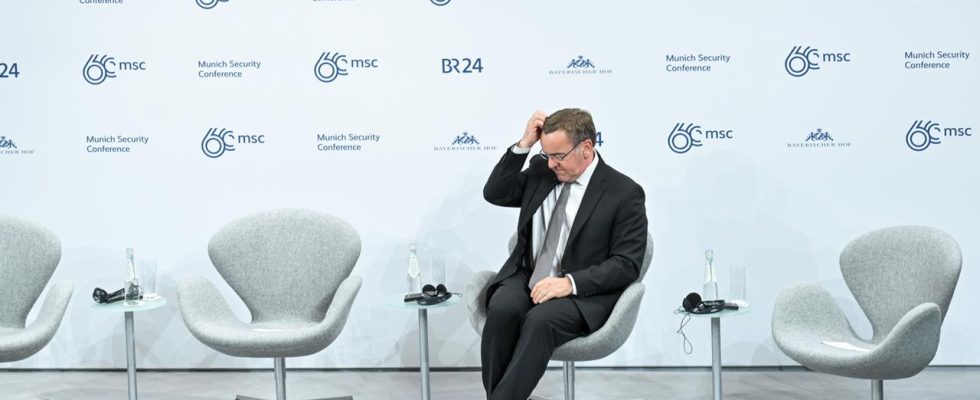analysis
The 60th Munich Security Conference is over – dominated by the topics of Ukraine and the Middle East. What impressions remain? How is the meeting going? An analysis in five points.
The dominant topic: Russia and Ukraine
It began with shocking news – the death of Putin critic Alexei Navalny. A dark start to the 60th Security Conference, especially since Navalny’s wife Yulia Navalnaya was in Munich and took the lectern in a remarkably composed manner.
The news remained a dark cloud over the conference. There was consensus among conference participants that Russian President Vladimir Putin was responsible for Navalny’s death. Even the timing of the news of his death was no coincidence, said Kiev Mayor Vitali Klitschko.
Navalny’s death may make it even clearer to the European and American public what opponents Ukraine – and the West – are up against with Putin. But a unified, convincing reaction from the West was missing in Munich.
Ukrainian President Volodymyr Zelenskyj once again used dramatic words to call for more help, more weapons and more ammunition. “Don’t ask Ukraine when the war will end. Ask yourself,” he said.
But even after this security conference, the impression remains: If the USA ceases to be Ukraine’s most important supporting country in the future because the Republicans in the US Congress permanently block new aid, the gap will be enormous. Too big for Europe to fill.
The invisible guest: Donald Trump
In addition to Vladimir Putin, he was the second invisible conference guest who shaped the debates: Donald Trump. He has not only prevented the Republicans from agreeing to further US aid to Ukraine. Trump’s threat has the effect of withdrawing the US guarantee of assistance from NATO countries that spend too little on defense. The senators and congressmen from the USA, especially from the Republican Party, were among the most sought-after discussion partners in Munich. But the public appearances of two senators were sobering.
Pete Ricketts, Republican from Nebraska, is actually a supporter of aid to Ukraine. But he struggled in Munich with the argument that democracy is sometimes chaotic and lengthy and that the Ukraine decision in Congress takes time. In the USA, the main problem is that thousands of migrants cross the border from Mexico every day. In truth, Ricketts, like many other Republicans, fears Trump’s power and his possible revenge on those in the party who turn against him.
JD Vance, a Trump admirer from Ohio, said it more directly: The USA sees China as the main challenge of the future, and Taiwan urgently needs support. Israel must also be supported with money and weapons. The conclusion was that America could not afford any more aid to Ukraine. And Putin, Vance said with frightening naivety, is just one of many villains around the world.
For the first time in many years, another Republican was not present in Munich: Lindsey Graham, Senator from South Carolina. Until recently, he had argued vehemently in favor of supporting Ukraine. Now he canceled the trip to Munich at short notice and demonstratively went to the border with Mexico. Graham also figuratively kisses the ring of political godfather Donald Trump.
Turning point in Germany? Rather hesitantly
In Munich, Chancellor Olaf Scholz once again appealed to the European partner countries to increase their support for Ukraine. With a view to skepticism in Germany itself, Scholz said: “This war in the middle of Europe demands a lot from us. The money that we are spending on our security now and in the future is missing elsewhere.”
But he also emphasized: “Without security, everything else is nothing.” Exemplary sentences for the German position. Something is moving, but reality only sinks in very slowly.
Officially, the goal of spending two percent of economic output on defense has been achieved this year. But apparently only with the help of a few calculation tricks, as was confirmed in the conference hallways in Munich. And how Defense Minister Boris Pistorius’ claim to soon reach three percent or more will be met remained unclear this weekend.
After all, CDU and Union parliamentary group leader Friedrich Merz and Green Economics Minister Robert Habeck expressed surprising agreement in interviews: Quite apart from the question of whether Trump would become US President again, Germany and the Europeans must do significantly more for defense – and they too Bring the defense industry into shape.
Exchange without progress: Middle East
The war in Gaza was, along with Ukraine, the second major topic of the conference. The conclusion here is quickly drawn – and once again sobering: There were numerous meetings, including between interlocutors who usually don’t talk to each other, for example between Israeli President Izchak Herzog and the head of government of the mediating country Qatar, Mohammed al-Thani.
For conference leader Christoph Heusgen, this was a “silver lining”. But there was no concrete progress towards a ceasefire, a new hostage agreement, or even towards the much-vaunted long-term goal of a two-state solution.
60 years: where is she headed? Security conference?
The former “military science conference” has changed significantly, it has become larger, the circle of participants, the concept of security and the range of topics have greatly expanded.
The “Global South” has been added as a new focus this year. An important issue is which side the countries previously referred to as “Third World” fall on, the side of the West or the side of Russia and China.
But the format of the conference raises the question: Would less be more in the future? Few focal points that are deepened, fewer participants, so focus?
There is no question that the conference itself makes sense and that, as the world’s most important forum for security policy, it also strengthens Germany’s international influence. Even if many participants this year ended up feeling rather helpless.

